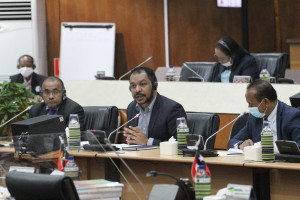Government and National Parliament discuss implementation of the Covid-19 Fund

The Government participated today, on 1 June, in the debate with members of the National Parliament on the implementation of the COVID-19 Fund.
The session was attended by the Minister of the Presidency of the Council of Ministers, Fidelis Manuel Leite Magalhães, the Minister of Parliamentary Affairs and Communications, Francisco Martins da Costa Pereira Jerónimo, the Minister of Finance, Fernando Hanjam and the Deputy Minister of Finance, Sara Lobo Brites.
The members of the Government presented the data on the implementation and execution of the measures under the COVID-19 Fund and responded to the concerns and suggestions of members of the National Parliament.
The Deputy Minister of Finance said that the implementation rate of the COVID-19 Fund has already exceeded 45%.
The Minister of the Presidency of the Council of Ministers explained that the measures of standardisation and economic recovery in the context of the COVID-19 pandemic are currently in the implementation phase. These measures are divided into three main components - the first refers to the support in which the State gives up revenue, such as the partial exemption in the payment of electricity bills, the second component refers to access to credit, a mechanism to support micro, small and medium-sized enterprises (MSMS), through which the State shares the risk of lending with commercial banks and the third component concerns the direct transfer of money, such as monetary support to households under the COVID-19 pandemic.
The measure to support households will cover more than 320,000 families and the process of identifying and reviewing beneficiaries is already being finalized and it is expected that the support begins to be paid by the end of this month.
The Minister of the Presidency of the Council of Ministers also stressed that the measures included in the economic recovery package are essential for the economic sector to continue to function, so that people affected by the negative effects of COVID-19 are protected from income losses and unemployment and that companies facing difficulties are able to maintain their activity in order to ensure the sustainability of the national economy.










































